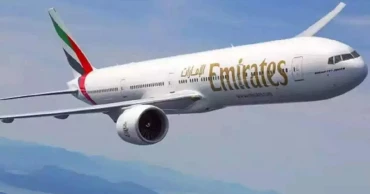Commercial aviation
Emirates to create $200mn fund for reducing fossil fuel use in commercial aviation
Long-haul carrier Emirates said Thursday it would create a $200 million fund for research and development projects aimed at reducing the use of fossil fuels in commercial aviation.
Emirates made the announcement ahead of releasing their annual report for 2022.
The airline, owned by Dubai's government, said the funding would be distributed over three years.
“It’s clear that with the current pathways available to airlines in terms of emissions reduction, our industry won’t be able to hit net zero targets in the prescribed timeline,” airline President Tim Clark said in a statement. “We believe our industry needs better solutions, and that’s why we’re looking to partner with leading organizations."
Emirates separately will aim to use so-called sustainable aviation fuel as well when possible — though it remains incredibly scarce in the market. In January, the airline successfully flew a Boeing 777 on a test flight with one of its two engines entirely powered by the fuel.
The announcement also comes ahead of Dubai hosting the COP28 climate talks in November.
2 years ago
Boeing predicts air travel in Bangladesh will double in next 10 years
US aircraft manufacturer giant Boeing has predicted that air travel in Bangladesh will double in the next decade – driven by the country’s growing population, expanding economy and the middleclass.
Boeing provided details about the increasing demand and capacity for air travel in Bangladesh in a briefing today in Dhaka, on its Commercial Market Outlook (CMO), a yearly forecast of global and regional demand for aircraft.
Through 2032, Bangladesh is expected to achieve an annual economic growth rate of more than 5% -- double the global average, supporting air traffic growth at nearly 8.5% annually, according to Boeing.
Read More: NOVOAIR launches direct flight on Jashore-Cox’s Bazar route
“As travel restrictions were relaxed over the past year, capacity growth in Bangladesh has increased by 11% year-over-year,” said Dave Schulte, Boeing Commercial Marketing Managing Director for Asia Pacific and India, on Wednesday (May 10, 2023).
Led by regional traffic to the Middle East and India, Bangladesh’s air travel could double over the next 10 years, he said.
To meet strong demands in passenger travel and air cargo, Boeing anticipates South Asia’s carriers will need more than 2,300 new commercial airplanes over the next 20 years, more than tripling South Asia’s current in-service fleet of 700 airplanes.
Read: US-Bangla Airlines to operate Boeing 737 Max 8
“We see tremendous opportunity in South Asia, with more than 80% of new deliveries supporting air travel growth and 20% replacing older, less fuel-efficient airplanes,” said Schulte.
Single-aisle airplanes like the Boeing 737 family will make up nearly 90% of South Asia’s future fleet, while 10% of the regional fleet will be widebody airplanes like the Boeing 787 Dreamliner. Both airplane models are currently in operation with Biman Bangladesh Airlines and US-Bangla Airlines.
“Boeing airplanes have played a tremendous role in the rapid growth of commercial aviation in Bangladesh. Commonality across the fleet will continue to play a major role in furthering growth, especially as it enables our airline customers to reduce operating costs and expenditures associated with training and maintenance,” added the Boeing Commercial Marketing Managing Director for Asia Pacific and India.
Read More: Target trade-based capital flight, not genuine consumption through imports: Economists
2 years ago



